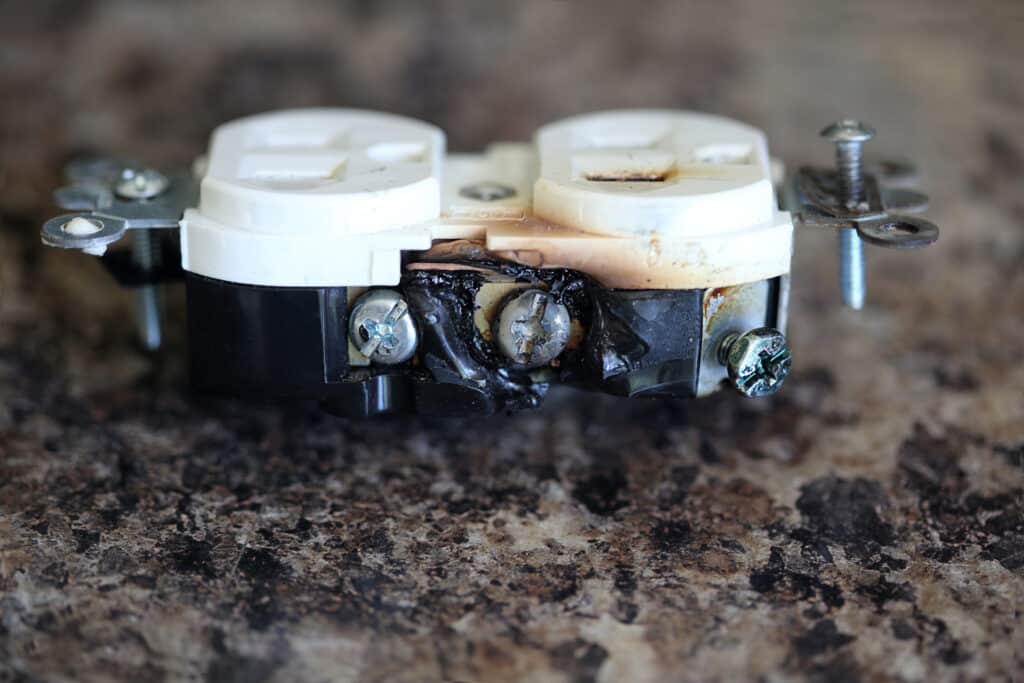Overloaded outlets are a hidden hazard in many Wilmington, DE homes, threatening both safety and property. Preventing overloaded outlets is essential for maintaining a secure and efficient living environment. Understanding the causes and recognizing early signs of trouble can help homeowners avoid electrical fires and appliance damage. With expert guidance from Mister Sparky of New Castle County, you can take proactive steps to safeguard your home from overloaded outlets.
Why Overloaded Outlets Are Especially Risky in Older Wilmington Homes
Wilmington, DE has many beautiful older homes, but their electrical systems often weren’t designed for modern power demands. These homes usually have fewer outlets, leading to the use of extension cords and power strips to accommodate more devices. This workaround easily results in overloaded outlets, especially when multiple appliances draw power from a single location. Over time, this setup can wear out wiring and increase fire risks.
Seasonal changes in Wilmington often lead to a spike in electrical usage. Cold winters encourage the use of space heaters, heated blankets, and extra lighting. Plugging too many of these high-wattage devices into older systems can strain circuits past their safe limits. The risk becomes even greater when outdated wiring can’t handle these power surges.
Warning signs include flickering lights, frequently tripped breakers, and outlets that feel hot to the touch. These issues may indicate that your system is working beyond capacity. Ignoring them increases the risk of overheating and electrical fires.
Regularly checking for signs of overload and distributing appliance use across multiple outlets helps reduce these dangers. Keeping load levels balanced is key to maintaining a safer home.

Common Causes of Overloaded Outlets in Wilmington, DE
Understanding what causes overloaded outlets helps prevent serious electrical problems before they start. Here are four of the most common reasons outlets become overwhelmed in Wilmington, DE homes:
-
Plugging in Too Many High-Wattage Devices
Appliances like microwaves, air fryers, and space heaters draw significant power. Plugging them into the same outlet can exceed its safe capacity. This overload generates heat and places stress on wiring. Over time, this can damage the outlet and increase fire risks.
-
Relying Heavily on Power Strips
Power strips often appear to be a convenient solution for limited outlets. However, connecting too many devices can push circuits beyond safe limits. Many homeowners unknowingly plug multiple strips into one outlet. This daisy-chaining setup increases the risk of overloaded outlets.
-
Using Extension Cords as Permanent Fixtures
Extension cords are designed for temporary use only. Relying on them long-term can create excessive electrical load. When used to power several devices, they silently strain circuits. This ongoing pressure can lead to overheating or even fire.
-
Outdated Electrical Infrastructure
Older homes in Wilmington may not support today’s energy needs. Fewer outlets and aging wiring systems can’t handle multiple devices. As power demands increase, so does the risk of overload. Recognizing this early helps avoid damage and ensures a safer home.
Warning Signs of Overloaded Outlets Every Homeowner Should Know
Knowing the warning signs of overloaded outlets helps prevent serious electrical hazards. These symptoms often appear before any visible damage occurs. If you spot these issues in your Wilmington home, take action immediately. Overloaded circuits can escalate quickly without proper attention.
-
Outlets Feel Warm or Hot
Heat is a strong indicator of electrical overload. When too many devices are plugged in, the outlet can overheat. Warm outlets may also signal poor connections or wiring problems. This is often the first sign that something’s wrong.
-
Discoloration or Scorch Marks
Visible marks around outlets show that heat has built up over time. These spots typically result from sustained overuse or internal arcing. Ignoring these signs may lead to a fire. They indicate overloaded outlets that need immediate attention.
-
Frequent Breaker Trips
A circuit breaker that trips often is protecting your home from excess current. This safety feature warns that your electrical load is too high. Constant resets should not be a routine fix. Address the underlying issue before it causes damage.
-
Flickering Lights or Buzzing Sounds
If lights flicker or outlets buzz when devices are on, there may be an overload. These clues suggest wires are stressed. Continued use under these conditions is unsafe. Reducing load can prevent serious issues from developing.
How Seasonal Changes in Wilmington Increase Outlet Overload Risk
Seasonal changes in Wilmington bring unique challenges that can raise the risk of overloaded outlets in many homes. Colder months increase reliance on space heaters, electric blankets, and indoor lighting. These high-wattage devices often run simultaneously, demanding more from electrical systems. If outlets are not spaced out properly, the load can exceed safe limits.
During fall and winter, families spend more time indoors using electronics and appliances. Televisions, gaming systems, and kitchen tools may all be in use at once. When several items are connected to one outlet, the risk of overheating grows. Without adjustments, circuits can become stressed quickly.
The holiday season adds even more strain with decorative lights, inflatable displays, and timers. These extras may seem harmless but can push circuits beyond capacity. Many homeowners unknowingly plug all holiday lights into a single power strip. This leads to classic cases of overloaded outlets without obvious warning.
Recognizing these seasonal habits helps reduce electrical strain. Rotating appliance use and plugging into different circuits can help manage the load. A few small changes during peak seasons go a long way in preventing problems.
Why Power Strips and Extension Cords Aren’t Long-Term Solutions
Power strips and extension cords offer temporary convenience but often contribute to overloaded outlets when used improperly or for too long. Many households rely on them to expand outlet access, especially in rooms with limited wall sockets. However, these tools are not built to handle continuous or heavy use. When overloaded, they become fire hazards rather than helpful devices.
Most power strips are not rated for high-wattage appliances like heaters, microwaves, or hairdryers. Plugging such items into the same strip leads to excess current flow. This strain can damage both the strip and the outlet it is connected to. Overloaded outlets are frequently the result of multiple power strips sharing one circuit.
Extension cords present similar dangers when used as permanent solutions. They are intended for occasional use, not daily power distribution. Running multiple devices through one cord increases the chance of overheating. In time, the cord and outlet may show signs of wear or even burn marks.
Reducing dependence on these tools can lower the risk of electrical problems. Plugging high-wattage items directly into grounded wall outlets keeps circuits within safe limits.
How Overloaded Outlets Affect Appliance Lifespan and Efficiency
Overloaded outlets do more than increase fire risks, they also wear down appliances over time. When electrical systems are pushed beyond their limits, appliances suffer silently. Here are four major ways overloaded outlets impact lifespan and efficiency:
-
Irregular Power Supply
Voltage fluctuations caused by overloaded outlets disrupt steady current flow. Appliances need consistent electricity to perform properly. This constant fluctuation stresses internal parts. Over time, devices slow down or stop working altogether.
-
Excessive Heat Exposure
Too much current leads to extra heat, affecting both outlets and plugged-in appliances. Electronics exposed to high temperatures experience internal wear. Heat breaks down wires, insulation, and delicate components. These effects reduce overall appliance performance and reliability.
-
Random Malfunctions and Shutdowns
Devices connected to overloaded outlets often shut off without warning. They might also operate unevenly or deliver inconsistent results. These glitches come from strained circuits and insufficient power flow. Appliances perform best with clean, balanced energy sources.
-
Shortened Appliance Lifespan
Frequent exposure to poor electrical conditions accelerates appliance failure. Motors, compressors, and circuit boards wear out faster. Replacing appliances becomes expensive and frustrating. Avoiding overloaded outlets helps equipment last longer and run efficiently.
Importance of Circuit Breakers in Preventing Overloaded Outlets
Circuit breakers are essential in protecting homes from the dangers of overloaded outlets and potential electrical fires. They are engineered to shut off power the moment circuits exceed safe levels. This automatic action prevents overheating, which could otherwise lead to major electrical damage. While a tripped breaker may seem like an inconvenience, it is actually doing its job to keep you safe.
When an outlet becomes overloaded, the circuit draws more current than it can handle. Circuit breakers detect this surge and immediately cut off the electricity. This quick response protects both the wiring system and the connected appliances from damage. Without this safeguard, even minor overloads could escalate into serious problems.
Multiple trips from the same breaker indicate ongoing stress on that circuit. Ignoring those warnings can lead to burnt outlets, fried electronics, or even house fires. These repeated interruptions are signs that too many devices are drawing power from one source.
In Wilmington, DE, Mister Sparky of New Castle County emphasizes the importance of well-functioning breakers. Regular inspections and balanced energy use help prevent overloaded outlets and support a safer, more efficient home.
How to Safely Distribute Appliance Use Across Multiple Outlets
Distributing appliances across multiple outlets is one of the most effective ways to prevent overloaded outlets in your home. Start by identifying which devices draw the most power, such as heaters, microwaves, or air conditioners. Spread these high-wattage items across different circuits whenever possible. This simple step helps reduce electrical strain and keeps each outlet within its capacity.
Avoid plugging several large appliances into the same outlet or power strip. Each outlet is rated for a specific load, and exceeding that limit can cause it to overheat. Even smaller electronics, when grouped together, can overload a single circuit. Dividing usage helps maintain balance and reduces the risk of damage.
Be mindful of outlet placement and circuit grouping within your home. Some rooms may share a circuit, even if outlets are in different locations. Understanding your home’s electrical layout ensures better power management. This knowledge helps avoid putting too much pressure on one area.
Developing these habits strengthens home safety and electrical performance. Preventing overloaded outlets starts with small changes like thoughtful appliance placement and responsible circuit use.
Dangers of Ignoring Overloaded Outlets in Wilmington Homes
Ignoring overloaded outlets in Wilmington homes can lead to serious consequences, both financially and in terms of safety. Overloaded circuits put excessive stress on your electrical system, which can weaken wires and melt insulation over time. These issues may go unnoticed until they result in sparks, smoke, or full-blown electrical fires. What seems like a small inconvenience could quickly become a home emergency.
Appliances and electronics also suffer when outlets are under constant strain. Power surges and voltage drops reduce their lifespan, causing premature failure and costly replacements. Burnt plugs, buzzing sounds, or discolored outlets are signs that damage has already begun. Continuing to use them only increases the danger.
Fire risks grow each time overloaded outlets are ignored, especially in older Wilmington homes with outdated wiring. These houses may lack built-in safeguards that newer systems include. Without intervention, one overloaded circuit could affect the safety of the entire home.
Taking action early helps avoid these outcomes. Identifying risks, spreading out power use, and staying aware of outlet behavior all play a role in preventing dangerous overloads.
Why Wilmington Homeowners Should Schedule Electrical Inspections
Wilmington homeowners should schedule regular electrical inspections to protect their homes from the dangers of overloaded outlets and faulty wiring. Inspections reveal hidden risks that can’t be seen by simply looking at an outlet or switch. Identifying issues early helps prevent overheating, electrical fires, and system failures. This proactive approach ensures safety and efficiency across your entire home.
Many homes in Wilmington have aging electrical systems not designed for today’s energy demands. Older wiring, outdated panels, and limited outlet access create perfect conditions for overloads. Inspections provide insight into whether upgrades or adjustments are necessary. Making those changes before problems arise saves time, money, and stress.
Each season brings new power demands, especially during Delaware’s colder months. Space heaters, lights, and kitchen appliances run more frequently, increasing circuit loads. Electrical inspections confirm whether your system can handle the change or if it needs reinforcement.
Routine checks provide peace of mind, knowing your home is protected against preventable hazards. By staying ahead of potential overloads, homeowners in Wilmington can enjoy a safer, more reliable electrical setup.
Final Thoughts on Preventing Overloaded Outlets in Wilmington Homes
Preventing overloaded outlets in Wilmington homes starts with awareness and continues through consistent, safe power usage habits every day. Simple steps like balancing appliance use, avoiding power strip overuse, and checking outlets regularly go a long way. These actions help maintain electrical safety and improve system performance year-round. A few smart choices can prevent major problems before they begin.
Overloaded circuits are more than just an inconvenience, they are a real safety threat. Left unchecked, they can lead to damaged wiring, failed appliances, and even house fires. Recognizing the warning signs early and acting quickly helps reduce those risks. Every outlet has a limit, and respecting that limit protects your entire home.
Homeowners should also consider seasonal changes and how they affect energy use. Cold weather, holiday lights, and indoor appliances can all increase the load on electrical circuits. Adjusting usage during these times helps keep outlets operating safely and effectively.
Mister Sparky of New Castle County proudly serves Wilmington, DE with expert electrical support. Preventing overloaded outlets means protecting what matters most, your home, your safety, and your family.

Conclusion
Overloaded outlets are more than an inconvenience, they are a serious hazard that can damage appliances and endanger your home. Taking proactive steps like monitoring device usage and scheduling regular inspections helps prevent electrical overload. These small changes make a big difference in system safety and efficiency. Acting early ensures your home remains protected all year long.
If your home shows signs of electrical stress, do not wait for the problem to grow. Flickering lights, warm outlets, or tripped breakers are warnings that should not be ignored. Addressing these issues now helps avoid costly repairs later. Keeping your electrical system in top shape starts with regular attention.
Mister Sparky of New Castle County is here to help Wilmington homeowners stay safe and secure. Our licensed electricians specialize in identifying risks and preventing overloaded outlets. Contact us today to schedule your electrical inspection and take the first step toward a safer, more efficient home.
FAQS
-
What are overloaded outlets, and why are they dangerous?
Overloaded outlets occur when too many devices draw more power than the circuit can safely handle. This excess load causes heat buildup, increasing the risk of damaged wiring and electrical fires. Even modern appliances can trigger an overload if used without proper spacing. Preventing this risk keeps your home and family safe.
-
What are the most common signs of overloaded outlets?
Warning signs include warm or discolored outlets, flickering lights, buzzing sounds, and circuit breakers that trip repeatedly. These symptoms indicate that the outlet is handling more current than it should. Ignoring them may lead to further damage or unsafe conditions. Addressing these early signs can help avoid serious electrical problems.
-
Can I use a power strip or extension cord to prevent overloads?
Power strips and extension cords help expand access, but they do not reduce the overall electrical load. Overusing them can actually make the situation worse. Plugging too many items into one power source leads to overloaded outlets. Use them carefully and only for low-wattage devices.
-
Why is this issue more common in older Wilmington homes?
Many older homes in Wilmington have outdated wiring and fewer available outlets. These systems weren’t built for today’s energy demands. As more appliances are added, the risk of overload grows. Regular inspections help ensure your home’s wiring can support modern use.
-
Who should handle outlet and wiring concerns?
Homeowners should avoid DIY electrical work. Contact a licensed electrician to inspect and upgrade systems safely. In Wilmington, Mister Sparky of New Castle County provides trusted service to prevent overloaded outlets and protect your home’s electrical health.










